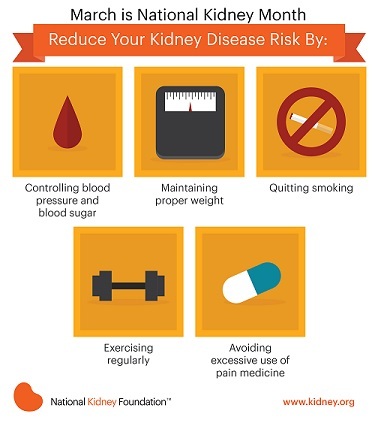 Kidney Disease kills more people each year than breast and prostate cancer combined. Yes, you read that statistic correctly, but you may be surprised by it. While the majority of Americans can recite the common tests for breast and prostate cancer, not many know very much about kidney disease, including its risk factors and the tests for detecting it. March is National Kidney Month and March 13 is World Kidney Day. In honor of these observances, show your kidneys some love by learning more about these sophisticated organs and what you can do to keep yours healthy.
Kidney Disease kills more people each year than breast and prostate cancer combined. Yes, you read that statistic correctly, but you may be surprised by it. While the majority of Americans can recite the common tests for breast and prostate cancer, not many know very much about kidney disease, including its risk factors and the tests for detecting it. March is National Kidney Month and March 13 is World Kidney Day. In honor of these observances, show your kidneys some love by learning more about these sophisticated organs and what you can do to keep yours healthy.
So let's start by getting back to basics, breaking down the who, what, where, when and how when it comes to the kidneys.
The Who: Who needs to be concerned about the kidneys and kidney disease? In an ideal world, everyone would have their kidneys on their radar, but the one in three American adults at risk for kidney disease definitely should be concerned about their kidneys. Those who fall in this category include people with the major risk factors for kidney disease: high blood pressure, diabetes, family history of kidney failure and being over age 60. Even if you aren't at high risk for kidney disease, everyone can benefit from learning more about the kidneys and keeping them healthy.
The What: The kidneys! Consider this the extremely abridged version of Kidney 101. Most people are born with two kidneys, but you only need one. The kidneys filter 200 liters of blood every single day, keeping the blood minerals in balance by removing toxins, wastes and water. This is the job the kidneys are most known for, but did you know that the kidneys have many other responsibilities? The kidneys also help regulate blood pressure, regulate fluid levels, control the production of red blood cells, and activate vitamin D for strong, healthy bones. When the kidneys fail, people must go on dialysis or receive a kidney transplant to survive. Unlike most other organs, because you only need one kidney, one of your kidneys can be donated while still living.
The Where: Where are these kidneys located after all? The kidneys are situated in your lower back just below the rib cage. They are the size of your fist and weigh about five ounces.
The When: If you're at risk for kidney disease, it's important to get your kidneys checked during your annual physical. The National Kidney Foundation's mascot, Sidney the Kidney, even has a music video to help inspire you to get tested. Be sure to speak up and request these two simple tests to check for kidney disease:
- A urine test for albumin, a type of protein. Protein in the urine is one of the earliest signs of kidney damage. When there is too much protein in the urine, it means that the kidneys' filters have been damaged and are starting to leak protein.
- A blood test for creatinine. Creatinine is a waste product (from muscle metabolism) that is removed by the kidney. Creatinine level is used to calculate your estimated glomerular filtration rate (eGFR). The eGFR reflects how well the kidneys are filtering wastes from the blood.
The How: Testing and prevention go hand-in-hand and knowing how to keep your kidneys healthy is an important element of preventing kidney disease. Following a healthy lifestyle is key to keeping the kidneys healthy! This includes exercising regularly, eating healthy foods and avoiding consuming high levels of salt and sodium, maintaining a healthy weight, quitting (or never even starting) smoking, controlling high blood pressure and diabetes and only taking pain medications as prescribed on the label -- for the shortest amount of time possible, at the lowest effective dose.
For more information about the kidneys and kidney disease, visit the National Kidney Foundation's website at www.kidney.org.
Did you know that high blood pressure and diabetes are two of the main risk factors for kidney disease? If you have either of these, what are you doing to protect your kidneys? Share in the comments below. Happy National Kidney Month!